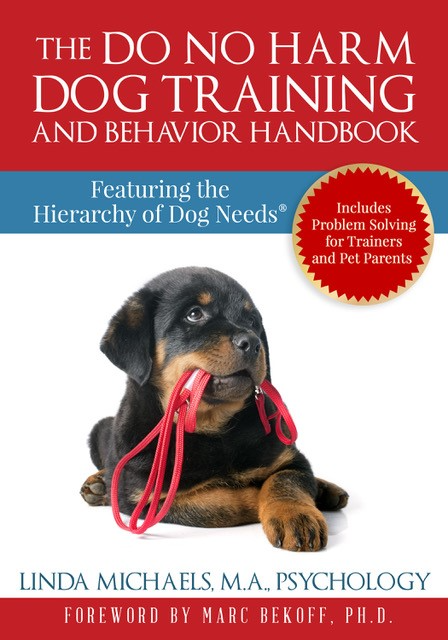This article reviews the just-published Do No Harm Dog Training and Behavior Handbook by Linda Michaels

By Katherine Porter
From pet parents to pet professionals, rejoice for a new paradigm in dog training behavior modification! The Do No Harm Dog Training and Behavior Handbook by Linda Michaels is groundbreaking.
As the primary starting point, Michaels synthesizes scientific research into practical guidance in addressing our pet dogs’ behavior concerns through meeting our dogs’ real needs. She peels back the layers of understanding, not only how our beloved dogs learn, but how their social and emotional well-being is at the heart of how they experience and operate in a person-focused world.
Do No Harm
Throughout the book, Michaels underpins the Do No Harm (DNH) ethical code used by other industries as the baseline for the care and training of our dogs. The first step in uniting the pet industry into prioritizing the welfare of our dogs, she believes, is grounding the pet industry in a DNH approach.
The DNH ethical code establishes the ideal principles in governing the conduct throughout the pet industry. By adapting this approach, we can no longer be blind to the welfare of our dogs.
The DNH Dog Training and Behavior Handbook is crafted as both a teaching tool and practical guide.
Part 1: The Hierarchy of Dog Needs guides both the pet lover and professional in how the DNH ethical code should be applied across the pet-related fields, as it is in other professions.
Based on Maslow’s Hierarchy of Human Needs, Michaels extrapolates with supporting scientific evidence how meeting our dogs’ needs creates a symbiotic relationship with them, and is the roadmap in creating the quality of life that your dog deserves.
“Dogs have the opportunity to reach an optimal state of well-being when all their needs are met. This is the singular objective of The Hierarchy of Dog Needs principles and procedures, standards of care and best practices,” she writes (p.11).
The DNH ethic also ensures the safety of our dogs while mandating a modern science and force-free approach in training, husbandry, and veterinary care by the professionals who serve them.
The DNH Training and Behavior Handbook illuminates how each of the five needs–biological, emotional, social, force-free dog training, and cognitive–work together holistically and synergistically to help our dogs to thrive.
“Research shows that when biological needs, safety needs and belongingness needs are met for social animals, they are far less likely to display abnormal behavior. The Hierarchy of Dog Needs is supported by scientific evidence as demonstrated in this handbook and makes no apologies for embracing protective ethics concerning our beloved dogs,” writes Michaels (p.3).
She further elaborates on each of the five needs, providing practical and easy-to-implement methods in how to satisfy our dogs’ needs.
Dog Behavior Issues and Training
Michaels’ professional behavior consulting experience is evident as she not only addresses behavior concerns in the DNH Training and Behavior Handbook, but she coalesces answers to the questions every pet parent asks.
Part 2: Setting Your Dog Up for Success dives into how pet parents can wisely choose a dog that fits their family, how to choose a good dog trainer, veterinarian and groomer and why this is critical, why socialization with your dog’s welfare at heart matters, enrichment activities, and understanding your dog’s body language.
In Part 3: Good Manners and Basic Training, Michaels provides the framework of teaching dogs life skills with a humane and gentle approach.
Pet parents and pet professionals can easily implement the same strategies Michaels herself utilized in guiding their dogs to become well-rounded canine citizens. The steps in teaching skills from sit to leash walking are easy to understand and can be easily implemented for any lifestyle.
Michaels takes the guesswork out of how to teach so the pet parent and pet professional can focus on building a loving and positive relationship with the dog at their feet.
The DNH Dog Training and Behavior Handbook also goes one step further in recognizing and addressing what to do and how to do it when life with our dogs doesn’t go as planned.
In Part 4: When Things Go Wrong, Michaels shares a deep understanding of the emotional experience of dogs when they are displaying behaviors like aggression or suffering from separation anxiety. She also provides a behavior questionnaire and contract template for quick implementation by the dog trainer and behavior consultant.
By offering insight into how behavior is the outward expression of what a dog is feeling internally, the person central in the dog’s life can remain sensitive to the dog’s experience in implementing a behavior modification plan.
Understanding Dogs
Through a Do No Harm approach in changing behavior we can really change the hearts and minds of our dogs, as well as our own.
The DNH Dog Training and Behavior Handbook is a must-have for any dog lover and should be on the shelf of every pet professional. Michaels provides a thorough understanding how dogs learn that surpasses other singular behavioral models. No other paradigm has the emotional and social needs at the heart of how dogs learn.
While we are always learning through new scientific research and studies, the one thing that remains constant is how the social and emotional needs of our dogs matter. Consideration of these needs should be first and foremost and anything that undermines the value of these needs is antithetical to the welfare of our dogs.
Do No Harm Dog Training and Behavior Handbook
Author: Linda Michaels (2022)
Pages: 324
Publisher: Do No Harm Dog Training, San Diego, CA
ISBN (print): 978-1-7322537-0-4
ISBN (ebook): 987-1-7322537-1-1
You can purchase the book here
Resources
H. Maslow, A.H. (1943). A Theory of Human Motivation. Psychological Review 50 370-396
